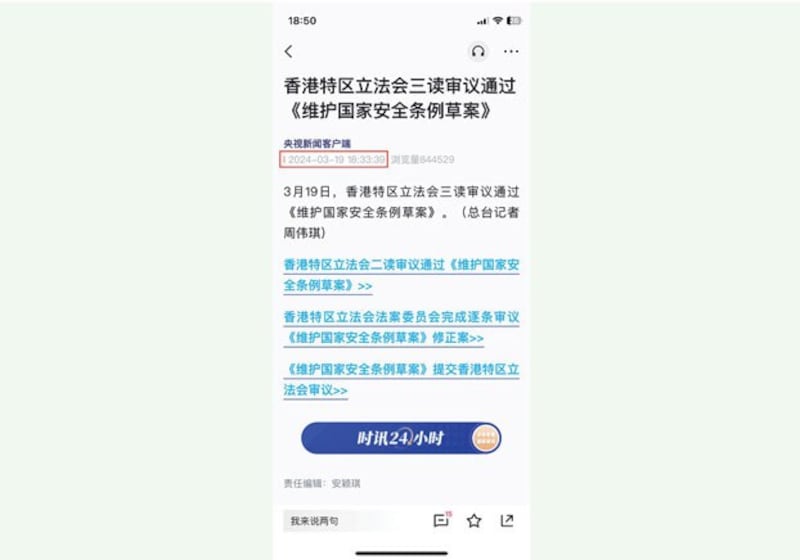When Hong Kong’s Legislative Council passed a strict national security law under Article 23 of its mini-constitution, the long-expected move hit global headlines within minutes.
Yet China's state broadcaster CCTV was faster than any of them -- it beat out its competitors by posting the results of the vote to its news client on social media platforms nearly 20 minutes before Council members had even started voting.
The Council's 89 lawmakers, all of whom won their seats under new electoral rules that allow only "patriots" loyal to Beijing to stand, voted unanimously to pass the Safeguarding National Security Law, that makes treason, insurrection and sabotage punishable by up to life in prison.
In scenes reminiscent of China's rubber-stamp parliament, the National People's Congress, lawmaker after lawmaker stood up to extol the benefits of the law, which will likely widen an ongoing crackdown on peaceful dissent, according to its critics.

Many had dressed for the occasion.
"Many government officials and members wore purple clothing and accessories, the theme color for Article 23, to show their support at the LegCo [Legislative Council] on Tuesday," the nationalist Global Times reported.
Schoolchildren turned up to see what Chief Executive John Lee described as a "historic" vote in their city's legislature, the paper said.
Lawmakers name-checked all the key ruling Chinese Communist Party talking points around the law, saying it was a necessary move to "ensure the safety of life and property" in the wake of the 2019 protest movement.
That movement called for fully democratic elections, the results of which can be surprising, and are never known in advance.
Digs and accusations
Councilor Dominic Lee added a dig at "hypocritical" former colonial governor Lord Patten of Barnes, while repeating the government's line that the law is no different from national security laws in democratic nations, despite the prosecution of dozens of activists and politicians for "subversion," for organizing a democratic primary in the summer of 2020.
Lawmaker Elizabeth Quat accused the United States of "demonizing the law."
There was so much praise and defense of the law that deliberations didn't conclude until 6:48 p.m. local time.
But for those who couldn't wait for the results of the historic vote, CCTV was there at 6:33 p.m., informing its readers: "Hong Kong Special Administrative Region Legislative Council passes 'Safeguarding National Security Law' on third reading."
It wasn't until after 6:48 p.m. that voting began in the Legislative Council chamber, nearly 20 minutes later.
Exiled former pro-democracy lawmaker Ted Hui said the Council, once the scene of vigorous political debate, regular protests, thrown objects and uncertain outcomes, is clearly now just another rubber-stamp body with voting results that are a foregone conclusion.
"The Legislative Council is just a rubber stamp ... and is just there to serve Beijing's political goals," Hui said.
"There is no longer any difference between the National People's Congress and LegCo."
Translated by Luisetta Mudie . Edited by Roseanne Gerin.
